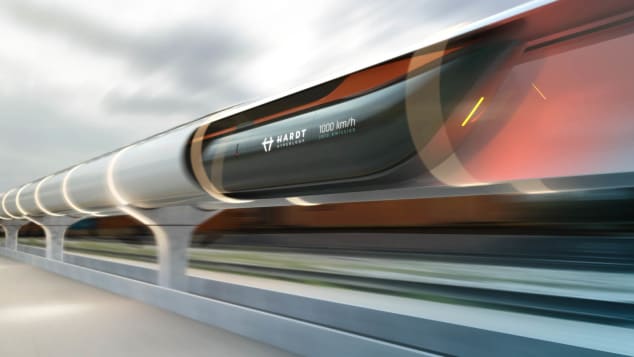(CNN) — Proposals to create a Hyperloop network that would carry passengers from Amsterdam to Paris in less than 90 minutes are under discussion in the Netherlands after a study that says the hi-tech link could be economically viable.
Hyperloop is a proposed transport mode that involves traveling in a sleek, pod-like capsule that’s propelled through a low-pressure steel tube at speeds of over 600 miles per hour.
Supposedly more sustainable than aviation and speedier than today’s top-speed trains, Hyperloop’s advocates say it’s the future of cross-country, and even cross-continental, travel.
Earlier this month, Dutch start up Hardt Hyperloop announced the results of a study carried out in collaboration with the province of North Holland which examined the experimental travel idea.
The report showed that a European-wide Hyperloop network would significantly shorten commuting times between European cities, blurring borders and offering “remarkable economic benefits.”
Better connecting the Amsterdam Metropolitan Area to other European hubs, the study suggested, would improve business travel and “strengthen the economic value of the province.”
The report says Hyperloop could ferry 200,000 passengers per hour, per direction. Travelers could reach Paris in 90 minutes — less than half the time it currently takes by train, and roughly the same time as a direct flight, without the need for airport connections. Amsterdam to Brussels would take less than an hour via Hyperloop, the study suggests.
This investigation marks the next stage in Hardt Hyperloop’s grand plan, following the opening of a test facility in June 2019.
Last year, the company’s CEO and co-founder Tim Houter told CNN Travel that Hardt Hyperloop’s proposed European network would provide an “alternative for the polluting short haul flights.”
Alternative to air travel?

On paper, it sounds like a win, but questions remain over Hyperloop’s feasibility.Part of the technology’s appeal is its sci-fi credentials — the idea of sleek, streamlined pods and levitating in a tube across county — but the concept’s still in its early stages.
There are concerns about whether the pods will be suitable for all ages and and how easy it would be to evacuate a pod in case of an emergency. Plus, big money needs to be invested to get it off the ground and governments need to be on side.
Still, Jereon Olthof, North Holland’s mobility deputy, said he was intrigued by the recent study, calling the benefits “very promising.””That is why we will engage in discussions with other authorities to progress this research,” he said in a statement.
Other Hyperloop companies around the world continue their attempts to advance the technology, originally the brainchild of Tesla boss Elon Musk.In 2017, Virgin Hyperloop One built a full-size pod which has reached speeds of 387 kilometers per hour on a test track in Nevada.
Virgin Hyperloop One and Dubai-based supply chain firm, DP World, got the green light by a state government in India in 2019 to develop a Hyperloop line between the cities of Mumbai and Pune.
Speaking to CNN Travel in 2019, Chris Dulake, global railways and transit leader at consultancy Mott MacDonald, a company that’s worked on the London Underground and Heathrow Airport’s Terminal 5, estimated 2030 was the earliest any of the Hyperloop competitors will reach certification.
Dulake added that once one of Hyperloop’s advocates successfully make it work, more will likely follow suit.
Credit: Source link